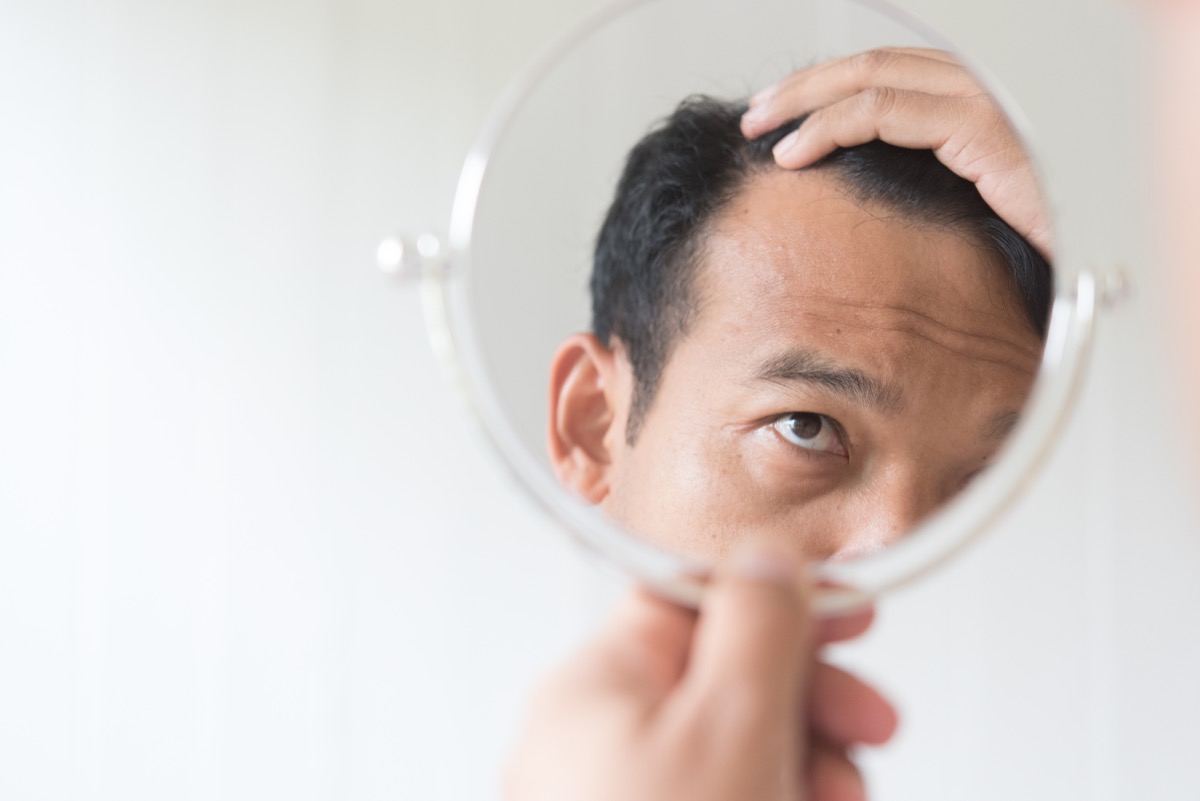50 Subtle Ways You’re Sabotaging Your Happiness, According to Expersts

Everyone wants to have a happy life. But most of us also know that getting there is a bit more complex than it seems. In fact, some people are sabotaging their own ability to find happiness without even realizing it. Repeatedly pursuing incompatible romantic partners, setting the bar too high at work, and spending too much time indoors are just a few of the ways you may be setting yourself up for a lifetime of disappointment. Yes, it’s wholly possible that you’re your own worst enemy when it comes to finding joy in life—and even worse, you might not even know it. To make sure you’re on steady footing in the pursuit of happiness, here are all the ways you might be sabotaging yourself, according to psychologists, mental health experts, and other professionals.
1
Not going outside often enough

One 2019 study published in the journal Scientific Reports corroborates what we’ve long felt: Going outside just feels good. As the researches note, just two hours a week in the great outdoors—whether it’s a full-on hike or a few walks around the block—can provide a major boost to your health, happiness, and overall well-being.
2
Not making the most of your commute

There’s a direct correlation between long commutes and decreased well-being, according to research conducted in 2014 at the University of Waterloo. But if cutting down your commute time isn’t a viable option, see if you can’t eek some enjoyment out of the journey instead.
“If you find yourself becoming cranky in rush hour traffic, make sure you have music you love to provide a private concert in your ears,” suggests Milana Perepyolkina, author of Gypsy Energy Secrets. “You can also listen to audio-books or even learn a new language.”
3
Letting little things get to you

Little annoyances are just a part of life. But if you frequently respond to such inconveniences with fury or irritation, you’re just creating a bad habit that hinders your ability to be happy.
“When little misfortunes do happen, accept them,” Perepyolkina urges. “In some cultures, it is considered good luck to find a hair in your soup or to break a cup. A little ‘bad’ thing is believed to keep the larger ones away in the way a small earthquake can release tension in the earth so that a big one may become less likely.”
4
Defining success by getting what you want

If you base your happiness solely on getting what you want, then you’re only setting yourself up for disappointment. “Our happiness is sabotaged when we believe we can only be happy if we get what we want,” explain Alex Lickerman, MD, and Ash ElDifrawi, PsyD, authors of The Ten Worlds: The New Psychology of Happiness. “If we don’t get what we want—which happens often—we’ll remain decidedly unhappy. Even if we do get what we want, our happiness will then depend on our keeping it. And when we lose it, as inevitably we always will, what was once the source of our greatest happiness then becomes the source of our greatest misery.”
5
Avoiding emotional pain at all costs

While you shouldn’t wallow in emotional pain, completely avoiding the experience of it can hurt your ability to heal, grow, and become a more mature person. “Seeking at all times to avoid pain turns out only to make us good at not feeling pleasure,” according to Lickerman and ElDifrawi. “Further, pain stimulates growth and is often necessary for us to break through obstacles that are making us unhappy.”
6
Prioritizing pleasure over all else

You might assume that if you’ve found a way to live your life by jumping from one luxury to the next, then you’ve really figured things out. But that’s not exactly an effective way to build happiness. “Believing that a life devoted to the pursuit of pleasure will make you happy will sabotage your happiness,” say Lickerman and ElDifrawi. “While it’s obvious why so many of us believe pleasure in general does engender happiness, it’s also obvious that a life devoted to the unbridled pursuit of pleasure is decidedly unhappy.”
7
Pursuing someone in a committed relationship

“Most people won’t leave their partner for you, despite how many promises they might make, or the sentiments they express in wanting to be with you,” say experts at The Eternity Rose. “If you fear rejection and being abandoned, you may find yourself drawn to someone who is unavailable, as this type of relationship may feel more ‘safe’ since your married or otherwise committed lover can never truly commit to you.” The end result, of course, is that you likely won’t end up with the person you’re eyeing—but will create a maelstrom of heartache for all parties along the way.
8
Expecting perfection in a partner

No relationship is perfect, so “searching for your soulmate according to a perfect scenario with unrealistic expectations—like the idea that you will never have any problems—leads to relationship failure,” says The Eternity Rose. “You’ll build someone up in your mind, go out with them, only to find they have imperfections that drive you crazy. This will surely kill any relationship hopes you may have held for this person, and lead you to believe they are not the one you have been looking for.” For the sake of finding a relationship that could potentially last decades, you should realize that imperfection is part of a healthy relationship and a happy life.
9
Picking fights in your relationship

If you’re someone who finds themselves initiating arguments with their spouse or partner, even if things are going well generally, then you’re sabotaging your relationship and your overall happiness to boot. While every relationship has its moments of conflict, mindset expert Heather Gray, MSW, explains that, for some, “when they encounter happiness, they experience sensations, thoughts, or feelings inside of themselves that don’t always have a name but are deeply uncomfortable. They then release those tensions by choosing their self-sabotaging behaviors without even realizing they’re doing it.”
10
Needing constant validation from your partner

Relying on a significant other to keep you feeling confident and content creates a fairly vulnerable feeling of happiness that can all come crashing down if there is any shift in the relationship. “If you do not like yourself, you probably come to rely on your partner’s approval and admiration to feel OK, but any reassurance that comes your way is only short-lived,” explains The Eternity Rose. “Within moments of the last compliment or romantic deed that your partner expresses, you are doubting yourself again, and your need to be loved and admired becomes insatiable—this leads to problems and arguments in the relationship, as your insecurities slowly wear it down.”
11
Or seeking validation on social media

Similarly, despite the undeniable rush of endorphins you get from seeing affirmations roll in on your social media feeds, putting too much stock in such attention can hinder your happiness in the long run, according to certified psychologist and life coach Cali Estes, ICADC. “If you’re feeling sad, you might scroll through social media looking for something to boost your morale,” she says. “But anything outside your control that you would rely on for happiness [is going to hurt your happiness].”
12
Distancing yourself from your friends

If you’ve been burned in the past, “being treated with respect can actually be the thing that causes internal distress,” says Gray. “When people are used to being hurt in relationships or have become accustomed to connecting to emotionally unavailable partners or friends, when someone is attentive, kind, and respectful of boundaries, that can be really uncomfortable.”
Often times, these people become suspicious of the healthy relationship, assuming it’ll go away, or that it will come with a cost. “As a result, they’ll test a well-intentioned person,” Gray says. “They might be brief or distant in an exchange, cancel plans, ‘ghost,’ or be otherwise irritable. In doing this, they’re operating under the internal assumption that there’s a catch to someone’s kindness, so they’re trying to either uncover it or test the limits of someone’s willingness to be unconditional in their regard of them.”
13
Or surrounding yourself with unhappy people

We are who we surround ourselves with. In fact, a 2008 study published in the British Medical Journal found that those who have happy friends (or even friends of friends) are more likely to be happy themselves. And the opposite is true too: Misery loves company.
Clint Swindall, author of Living for the Weekday, urges anyone to take a step back and look at the people they consider close to them. “Do an analysis of your circle of friends and see whether they add to your life or take away from it,” he writes. “Surround yourself with people who will help you reach your goals.”
14
Expecting the worst from yourself

“To some, it is better to control their own failure rather than having it come by surprise,” says Estes. “In this way, it’s easier to say that they knew it wouldn’t work out and not try to make it better. This is because, if they fail, they have to actually confront their failure.”
The cumulative effect of this sort of preconceived thinking is that you end up internalizing these negative views and not only start believing them yourself, but projecting them in a way that has others believing them as well.
15
Not seeing the positives

Putting the emphasis on all that isn’t working out and ignoring what is—like a pair of reverse rose-colored glasses—can cause long-term problems for one’s happiness. Tricia Wolanin, PsyD, a clinical psychologist and author of The Fragrance of Wanderlust, says she had a friend who viewed the recent events in his life as an example of this kind of negative thinking: “He refused to see his amazing promotion that very few people achieve in his field, the raise, positive people in his life, the travels, and intimacy he experienced during the year. What he chose to focus on was the negative aspects that occurred. This was the medical illness, break-ups, debt, or people that have pushed him away.”
16
Limiting your career options based on your education

Education is essential, and can prepare you for much of what you career will throw your way. But assuming your options are limited to a single piece of paper you earned when you were 22 is short-sighted, at best. “People may succumb to remaining in the same job or income level because this is what their degree is in,” says Wolanin. “They do not realize the numerous doors that are open if they only took the first step by taking a chance. All of this is fear-based. We don’t think we will succeed, so we don’t even try, therefore sabotaging our happiness.”
17
Or tapping the breaks on your career

Sometimes change can happen fast, which can be scary for some people. It’s not unusual for someone who suddenly gets a big break—one that might mean stepping into the unknown—to try to slow-walk their own progress. “They might feel uncomfortable with success or with the expectations that come with success,” says Gray. “That unconscious internal struggle will kick in and they might try to sell their product with less ambition if they own a business, they might keep an idea they have to themselves after getting praise from a boss. They might have a sales call where they know they nailed it, but they’ll avoid following up and getting the prospect to sign on the dotted line.”
18
Working too much

Work gives us a sense of purpose, a group of like-minded people, and, of course, financial stability. But it’s also very easy to go overboard, and completely obliterate any work-life balance, ultimately chipping away at your happiness. “Feeling bogged down and overworked at the office can lead to anxiety and depression,” says Bryan Bruno, MD, medical director at Mid City TMS, a New York City-based medical center focused on treating depression. “To prevent burnout at work, section off your daily tasks and realize that not everything has to be done immediately. Taking adequate time off to keep you sharp and productive is also important.”
19
Or not working enough

While working too much can hurt your happiness, not working enough can have a negative effect on your life, too. Alex Palmer, author of Happiness Hacks, writes that, “a reduction in hours is generally accompanied by a drop in happiness, while a shift from part-time to full-time increases happiness.” (However, he also points out that “if you’re already working full-time, taking on an 80-hour week will almost certainly not double your level of happiness.”)
20
Expecting that money will provide happiness

A landmark 1985 study out of the University of Illinois and the University of Pennsylvania of the Forbes 400 richest Americans found that the wealthiest people in the country were just as happy as the Maasai people, hunters and gatherers who live without electricity and running water in East Africa. In other words, you can’t expect a big paycheck to lead to a big smile—it doesn’t always work like that.
21
Eating lunch at your desk

Sometimes you’re busy and just don’t have time to run out for a bite. But, as one 2013 study published in the journal Academy of Management revealed, having lunch at your desk rather than taking a proper break that gets you up and out of the office can dampen your spirits. “Put down that sad desk salad!” Palmer urges in his book. “However long your break runs, the key is to make it a true break, getting out of the office and fully relaxing during the time off.”
22
Eating an unbalanced diet

Eating habits have been found to play a major role in our well-being and overall happiness. Bruno says that we often overlook the fact that our bodies and brains need the right vitamins and nutrients to function properly. “Vitamins B12, B6, and B3 facilitate the communication between neurons and the transport of neurotransmitters,” Bruno explains. “A healthy brain means better chemical balance, and ultimately a better mood.”
23
Not getting enough exercise

Just as maintaining a healthy diet is as good for your mind as it is for your body, same goes for a regular workout regimen. “Exercising at least a few times a week is just as important as eating well,” Bruno says. “Not only will exercise improve your confidence and body image, but it will also release endorphins in the brain, which [can] enhance your mood.”
24
Setting your expectations too high

Holding yourself to a high standard can be a good thing. But if you set the bar impossibly high, that will only result in you feeling down in the dumps. “If we hold on too tightly to perfection, our creativity becomes stifled and we are never able to truly enjoy the process,” says G. Brian Benson, life coach and author of Habits for Success: Inspired Ideas to Help You Soar. “For some, the pressure of having something be perfect keeps them from even starting. And for others, it never allows them to finish because it will never be ‘perfect.’”
25
Being judgmental

Whether you assume the worst about the guy who cut you off in traffic or repeatedly criticize your partner for petty things, a judgmental outlook is bad for all parties—especially the person passing judgment. “It’s imperative to let go of judgement and show more compassion toward ourselves and others,” Benson says. “Being judgmental to others is a sure sign that we are being judgmental to ourselves.”
26
Comparing yourself to others

If you measure your life—your relationships, your body, your career progress, your number of social media followers, etc.—against the lives of other people, you’ll never feel fully satisfied. “Society certainly isn’t doing us any favors with all of the body image advertising coming at us—advertising that can make us feel less than whole and send messages that we need to buy their product to become worthy and lovable,” Benson says. “Social media has also trained us to see only the best of others, while we unfortunately compare that with the worst of ourselves.”
27
Being overly self-critical

“Every time we say something negative, we are planting a negative seed,” says Benson. So, what might start out as a way to avoid a major emotional letdown, can, over time, become a seriously damaging habit. “What happens is simple: We begin to live out what we tell ourselves: ‘I can’t do this,’ ‘I’m an idiot,’ ‘I am a fool for thinking that,’ etc.,” Benson explains.
28
Underestimating what you’re capable of

Steven Rosenberg, PhD, a psychotherapist and behavioral specialist, cites “self-limiting beliefs”—which are generally adopted as a protective mechanism—as a common way people sabotage their own happiness. “As an example, if you want to lose weight, you avoid going on a diet,” he says. “The reason you choose is simple: ‘Why should I lose weight? I always gain it back anyway!’ These are self-limiting beliefs.”
Rosenberg explains we usually do this because of an innate low sense of self-worth, but also as yet another attempt to control our own failure.
29
Believing you are an imposter

“Many times, as a person advances in life, they become afraid of being found out as an imposter,” explains Rosenberg. “This is the imposter complex: ‘I don’t deserve to be in this high-capacity position in life.’” Needless to say, this is a major detriment to one’s happiness.
30
Making others the scapegoat

Blaming others for our mistakes undercuts our long-term ability to find true satisfaction in life, according to Rosenberg. Scapegoating, he adds, not only prevents us from addressing the underlying issues at hand, but can also damage relationships and friendships, and—most importantly—can distort how you see yourself.
31
Procrastinating

Practically every person has been guilty of procrastinating at some point in their life, and for good reason: It feels good in the moment. But, according to Rosenberg, whatever you’re stalling on won’t just disappear overnight. The work that needs to be done or the uncomfortable call that needs to be made is still there, ultimately weighing on you and blocking your happiness in the process.
32
Self-medicating

Many, many people look at their issues, and then, instead of trying to resolve them, they self-medicate with drinks, cigarettes, food, or anything else that activates the pleasure centers in their brain. The thing is, while self-medication may feel good in the moment, it’s doing damage ultimately. “Many people self-medicate with either alcohol or drugs to cope with these feelings of low self-esteem,” says Rosenberg. “A drug of choice might even be food. We can overeat through stress. These things can be dangerous because they are subtle. ‘Just one more drink or one more cookie…'”
33
Being self-righteous

If you’re in the habit of calling out people for saying things you don’t like—and seem to do so on a daily basis—it’s likely you’re doing the most damage to yourself, not those who are offending you, according to relationship expert Cherlyn Chong. “[Unhappy people] sometimes have a misguided sense of righteousness, resulting in the harsh judgments of other people,” she says. And this judgmental attitude will take its toll in the long run.
34
Focusing on things instead of experiences

In a 2011 survey published in the Journal of Consumer Psychology, 57 percent of respondents reported happiness from experiential purchases, while only 34 percent of those who made material purchases felt the same. Basically, the Harvard University researchers confirmed you’ll get more satisfaction and long-term happiness out of a week-long vacation or simply a dinner out than out of a new tablet or pair of shoes. If you throw yourself into acquiring the hottest gadgets or the fanciest clothes, you’re more likely to feel dissatisfied with them once the novelty wears off.
35
Not preparing for the transition back to life after a vacation

In a 2010 study of Dutch workers published in the journal Applied Research in Quality of Life, researchers found that there was a much higher average level of happiness among those who were planning a vacation, compared to those who had recently returned from one. Once they came back from their trip, the workers quickly returned to their baseline level of happiness, while those looking forward to the enjoyable experience had higher levels of happiness for sometimes months ahead of their vacation.
The lesson? Those who expect a vacation to create long-term enjoyment will be disappointed. Better instead to focus on a positive event in the future—you’ll generate much more happiness from the anticipation.
36
Overdoing it with online dating

When it comes to relationships, dating apps have hugely increased the volume of potential partners for people to consider. But while the rapid-fire swiping might deliver quantity, it can have a long-term negative impact on one’s outlook on finding love and happiness in general. “We’ve made people a commodity when it comes to dating,” says Trish McDermott, a dating expert and relationship coach at the collaborative dating portal Meetopolis. “With a mindset that there are thousands out there waiting for us, we swipe people away for trivial reasons—his hair color, her neck, his eyebrows, the shape of her ears—none of which has anything to do with what makes a healthy, happy relationship possible. Or we instantly reject people simply because we think there’s someone just a little bit better, taller, thinner, or possessing some other quality we’re searching for coming up next in the queue.”
37
Forgetting to focus on the things you like about yourself

By forgetting to stop and appreciate what’s great about who you are, you undermine your own happiness. Certified mindful lifestyle and stress management coach Susan Petang, author of The Quiet Zone, suggests writing down one or two things you love about yourself every day. “It can be as simple as, ‘I have beautiful hands,’ to, ‘I am an outstanding problem solver,’” she says.
38
Not being present

A common trait of happy people is that they stop and appreciate what’s going well in their life, whether it’s a good meal or a great friend in their life. “Find wonder, amazement, and gratitude for that particular moment,” says Petang. “It’s not helpful to remember past mistakes and trauma since it’s in the past; it’s not helpful to worry about the future since it isn’t here yet.”
39
Taking life too seriously

Some things in life need to be given careful consideration—but not everything. Researcher Paul McGee has spent decades studying the positive psychological effects of humor, drawing on a number of international studies that have found approaching situations with a lightheartedness “improves your daily mood, boosts optimism, and improves your ability to cope with stress,” he writes in his book Humor as Survival Training for a Stressed Out World. Approaching things in a more playful way puts day-to-day challenges into perspective and reduces their power to have a negative impact on your happiness.
40
Missing—or not taking—opportunities to help others

One of the most consistent findings of research into happiness is that doing things for other people boosts one’s own ability to smile. A pair of major studies—one published in 2015 in the journal Clinical Psychological Science, and one published in 2016 in the journal Emotion—revealed that there’s a direct link between random acts of kindness and increased dopamine levels.
41
Waking up to an alarm clock

When you go to sleep and when you wake up (which is known as your circadian rhythm) is directly linked to your health and happiness. A 2016 study published in the journal Current Biology found that forcing yourself to wake up with an alarm clock leads to chronic sleep deprivation and misalignment of your circadian clock, which can result in mental health issues, like depression. Instead of depending on that irksome ringing to get out of bed everyday, go to sleep early enough to get the necessary eight hours of rest. In doing so, you should be able to wake up naturally sans alarm clock.
42
Not doing the work to better understand who you are

“People sabotage their happiness because they don’t know their own story,” says Mike Ensley, MA, LPCC, a counselor based in Loveland, Colorado. “They are not aware of the false beliefs that color how they experience events and relationships, or of the inner wounds that drive unhelpful avoidance and self-protection.” Those who put in the time to better understand themselves and why they are driven toward particular types of behavior are more likely to find happiness and peace, Ensley says.
43
Having unrealistic expectations for other people

“One of the biggest ways I see people sabotage their own happiness is by holding unrealistic expectations of others and the world around them,” says James Killian, LPC, principal therapist and owner of Arcadian Counseling. This can extend to random strangers or to those closest to us: If we expect others to behave a certain way, we are sure to be disappointed. Killian gives the example of expecting drivers on the road to be respectful and courteous, then getting frustrated and resentful (maybe yelling at the cars) when they fail to do so.
44
Not surrounding yourself with enough lighting

Room lighting has a serious impact on your emotional state, for better or for worse. One 2014 study published in Social Psychological and Personality Science found that feelings of hopelessness correlated to participants’ perception of the lighting in the room that they were in. When the room was darker, the subjects were more likely to feel hopeless.
45
And staying out of the sun generally

The sun provides mood-boosting vitamin D, and not getting enough of it can seriously deflate your spirits and have other negative effects on both your physical and mental health. But you needn’t live in a balmy zip code to reap the sun’s benefits: According to a 2013 study in The Journal of Biological and Medical Rhythm Research, even using lights that merely imitate the sun’s rays has been found to have a major positive effect on mood.
46
Watching too much television

Spending too much time in front of the tube can have a negative effect on your mental health. According to a review of 30 years of research published in Social Indicators Research in 2008, happier people were found to spend less time watching TV and more time being socially active and reading the newspaper.
47
Comparing your current self to your previous self

“I often hear people in my life comparing themselves to the body type they had 10 years ago, or who they were before they had children,” says Melissa Coats, licensed professional counselor with Coats Counseling. “Many times, we hold this as the standard for what we ‘should’ be in life, and we spend an exorbitant amount of energy trying to ‘get back to’ who we think we really are. The reality is that we cannot go through life without change.”
She emphasizes that it is normal to adjust to circumstances, and healthier to dedicate time and energy to loving who you are now, rather than comparing yourself to who or what you were a decade (or more) ago.
48
Projecting your feelings onto someone or something else

Assigning a negative feeling to someone or something else may be eating away at your happiness. Coats gives the example of someone projecting hurt or anger by saying things like, “My spouse is ruining my life,” or “If I just got that promotion, I wouldn’t be late all the time for work.”
“Usually this involves waiting for someone else or a circumstance to change in order to feel better,” she says. “But what actually happens is that other person changes or the circumstance changes and we end up still feeling the same way. The common denominator here then is our own feelings and our response to them.”
49
Ignoring your blind spots

“We all have blind spots,” says Coats, who defines these as “areas in our life that operate on a subconscious level and have the potential to be very damaging if we don’t notice them.” These can be patterns in how you relate to your boss, friends, and partners—or some other habitual behavior that you might be unaware of.
“Looking at a situation from only one perspective does not serve us well in the long run,” says Coats. “It may be more comfortable to rely on our own perspective, but we might miss something big. The beauty about blind spots is that when they are pointed out, we can correct the course.”
50
Refusing to ask for help

Remember that finding happiness doesn’t fall entirely on your shoulders. Others are there to help. “I still see many people with a deeply rooted belief that asking for help is weakness,” says Coats. “We only have so much time and energy to spend in a day. So many of us are used to overdrawing that account. If we were to ask for help in seeing our blind spots, talk to someone about how we are really doing, see a therapist, or delegate some tasks to others, we would have much more time and energy in the emotional account for the things that bring joy to our lives.”